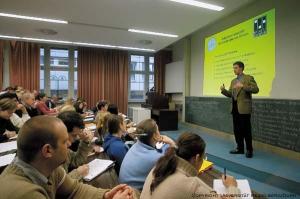Religious Studies

Course outline
Course structure
Main research interests
Formal requirements
Academic advisor
Contact
| Degree: | Master of Arts | |
| Application required: | access-restricted | |
| Course commences: | winter semester / summer semester | |
| Standard course duration: | 4 semesters | |
| Format options: | full-time / part-time | |
| Language requirements: | one source language relevant for religious history except English and French (on application) | |
| Language of instruction: | English and German | |
| Other features: | postgraduate / consecutive |
Course outline
Graduates of a Bachelor’s degree programme in Religious Studies, who completed the programme with above-average grades, have the option of enrolling in a subsequent Master’s degree programme in Religious Studies.
The focus of the consecutive Master’s degree programme in Religious Studies at Heidelberg University is an in-depth analysis of various religions in the past and the present. Similar to the Bachelor’s degree programme in Religious Studies, students in the Master’s degree programme will be expected to consolidate their knowledge of methods from the broad spectrum of Cultural Studies and Social Sciences and to independently apply these to case studies and scenarios from religious history. Empirico-cultural Religious Studies in Heidelberg are characterised by a high degree of interdisciplinarity. The partially variable structure of the degree programme enables students to consolidate their specialisations from the BA programme during the course of the MA programme, and to therefore develop their skills profile in accordance with their respective career goals. Thanks to the degree programme’s empirico-cultural and interdisciplinary orientation, students in the MA programme are given the opportunity to develop and apply analytical skills in a diagnosis of time on significant sociopolitical questions, e.g., in the fields of fundamentalism, violence and religion, migration and integration.
The sociopolitical significance of religious studies provides students with an interesting variety of potential professions such as in consulting institutions on religious questions, adult education, journalism, publishing, tourism/travel guiding, exhibition and congress management as well as museums. The choice of career depends mainly on the graduates’ personal interests and individual foci. In addition to research-oriented know-how, students are also introduced to professional life through e.g., internships or the practice-oriented specialisation module.
Course structure
The Master’s degree programme in Religious Studies consists of a theoretical-methodological component that focuses on either religious history or current religious developments as well as a research- and practice-oriented module. The Institute for Religious Studies offers students a broad range of courses that allows them to further develop their specialisations from the BA programme. These specialisations are supported through the integration of teaching imports from related disciplines that are clearly outlined in the range of interdisciplinary courses in religious studies (ILR).
Thanks to the interdisciplinary and theoretical-methodological, multi-perspective structure of the Master’s degree programme in Religious Studies at Heidelberg University, students acquire differentiated knowledge of religio-historical and current religious contexts as well as specialist and reflected methods to study these contexts.
A special feature of this degree programme is that students can choose either a research-oriented or a practice-oriented specialisation. This enables graduates to either obtain a doctorate or work in fields such as journalism, international organisations (e.g., development cooperation or human rights organisations), international corporations, cultural management, intercultural consulting institutions, education or museums.
Students must write a research-oriented Master's thesis in the fourth semester. Religious studies can be studied as a one-subject Master’s degree programme, in combination with a minor subject, or as a minor subject in combination with a major subject. All details on grades, credits, modules and degree are listed in the examination rules and regulations and the module handbook, which can be downloaded from the homepage of the Institute for Religious Studies.
After successful completion of the Master’s degree programme, graduates whose final overall grade was at least a 2.0 (“good”) may apply as doctoral candidates to the Religious Studies department.
Subsidiary (minor) subject
Students can either choose the Religious Studies course as a one-subject Master of Arts programme or select a subsidiary (minor) subject accounting for 20 CP to go with it. Click here for a list of all subsidiary subjects on offer.
The M.A. course in Religious Studies can also be studied as a subsidiary (minor) subject accounting for 20 CP.
Main research interests
The main research interests at the Institute for Religious Studies are the religious history of Europe and the US, religious traditions in pre-Islamic Iran as well as ancient and especially current Japanese religious history. Further research interests include modern research on rituals, religious museology, the analysis of transformations in Buddhism in a global context and analyses of religion on the Internet and in digital games. The following two insights are taken into account in current religious research: On the one hand, religious beliefs and practices are not static or unchangeable. Instead, they are subject to constant changes both in history and in individual biographies. On the other hand, religions are not only spaces of intellectual realisation; they are also transmitted via senses through e.g. rituals or specific design, material or aesthetics. Therefore, the theoretical specialisations at the Institute for Religious Studies are based on theories regarding individual religiousness and the dynamics of rituals as well as on new paradigms and approaches of the so-called “material religion” (religious aesthetics) and marketing/branding theories (religious economics).
Formal requirements
Admission
Access to the course is restricted. The current Admission Regulations are available here.
Prospective students from Germany
Prospective students from Germany can enrol without prior application at the Central University Administration building by the beginning of the lecture period. To matriculate, they are required to show a written statement of admission issued by the representative of the Master’s programme they wish to attend, confirming that the requirements set out in the Admission Regulations have been met. Please apply to the Institute of Religious Studies for further information on how to proceed.
International prospective students
Prospective students from other countries must apply in writing, so that their previous academic record can be verified. The deadlines for international applicants are 15 June for the winter semester and 15 November for the summer semester. Applications must be addressed directly to the International Relations Office. Please use the M.A. application form here and enclose the necessary documents.
Further information
Current information on procedure
Study and examination regulations
Examination regulations M.A. (29 July 2015, last amended 10 December 2018)
Examination regulations M.A. (29 July 2015)
Examination regulations M.A. (4 April 2007)
Module Handbook
Please click here to find the latest Module Handbook (see „Schwerpunkte in Heidelberg“).
Examinations board
Issues arising in connection with examinations, credit transfer and academic credential recognition are dealt with by the relevant examinations board/office. For more information, consult the academic advisor(s) indicated below.
Fees
Tuition fees at Heidelberg University are payable at the beginning of each semester.
Academic advisor
Dimitry Okropiridze, M.A.
Karl Jaspers Centre for Advanced Transcultural Studies
Voßstraße 2, Building 4400
Room 021
D-69115 Heidelberg
office hours by appointment
e-mail: dimitry.okropiridze@asia-europe.uni-heidelberg.de
Contact
Institute of Religious Studies
Akademiestr. 4–8
D-69117 Heidelberg
Secretaries' office:
phone: +49 (0)6221 547622
fax: +49 (0)6221 547624
e-mail: sekretariat.religionswissenschaft@zegk.uni-heidelberg.de
Internet: http://www.zegk.uni-heidelberg.de/religionswissenschaft/
Location
Student representation:
e-mail: fs.religionswissenschaft@stura.uni-heidelberg.de
Internet: http://www.zegk.uni-heidelberg.de/religionswissenschaft/studium/fachschaft.html

